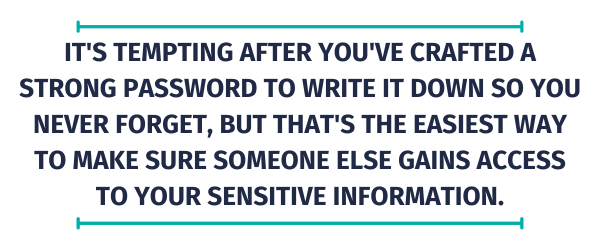The Foundation of Good Security? Strong Passwords
07/24/2025
By: Conor Moreau, Emily Brassley

Please, please tell me your password isn't Password123; that's all I ask. Account security is a huge concern - with companies constantly leaking people's information, hackers getting craftier, and rapidly advancing technology, it's hard to feel like your online accounts are actually safe.
We've covered how multifactor authentication can go a long way toward protecting you in our Financial Tip to Do Better: Protect What Matters Most: Embrace Multifactor Authentication Now. That's not enough - we need to start at the root of the problem. Don't worry, we'll help.
It's time to start creating better passwords.
A Strong Passwords Sets Your Security Foundation
Applying for jobs, accessing medical records, bank accounts, credit cards, or just shopping online - more and more of our lives become online every day.
Your password is your first line of defense in stopping attacks and suspicious activities. Think of it as a moat full of crocodiles keeping malicious actors a little further away from your sensitive information. It protects you from vulnerabilities like cyber threats and data breaches.

Let's Make it STRONG!
Here are simple steps you can take to make your password tougher to crack:
- Create Long Passwords: The more characters a password has, the more difficult it is for scammers and malware to crack. Although length requirements vary by account and website, work to create a password of at least 12 characters or more.
- Include Special Characters: Using a variety of characters also makes it more challenging to solve. A strong password should always include a mix of the following: Uppercase Letters, Lowercase Letters, Numbers, AND Special Characters (e.g., ! $ & * ~ @ %). The more special characters and numbers you include throughout your password (not just at the beginning and end), the more complex and less easily compromised your password will be.
- Avoid Personal Information: Sure, the easiest information to recall is personal details about yourself, your family, or your pets. Hackers will look for these clues by following your digital breadcrumbs (social media accounts, public records, etc.). From there, it's a simple guessing game to gain access to your accounts. Make sure your passwords don't include any personal details!
- Avoid Dictionary Words: A good rule of thumb when crafting an uncrackable password is to avoid long strings of consecutive letters. That's why including special characters is crucial. You can create a unique password – or even better, a passphrase – and swap out letters or "words" in the code or phrase with numbers and symbols for increased security.
So, What Should I do?
It's easy to say what not to do - avoid simple passwords like 123456, but let's go over some examples of strong passwords that can protect your data.
Weak: fidoiscute
Strong: *F!d0i5Cut3*
Weak: WeAreTheChampions
Strong: ~W3@r3+h3Ch@mp10n$
Weak: ILoveTheCubs
Strong: <Ch1cag0Cub$>

I Don't Remember...
It's tempting after you've crafted a strong password to write it down so you never forget, but that's the easiest way to make sure someone else gains access to your sensitive information.
Consider a secure password manager application to help you remember. Password managers are programs that save and store your login details, automatically filling them in when you log in to a website or app. Many password managers also generate secure and unique passwords for you. They're a helpful security measure that allows you to generate and store unique passwords for all your accounts.
Enable MultiFactor Authentication:
A simple step to add an extra layer of protection to your passwords is enabling multifactor authentication (or MFA) wherever possible.
MFA uses a variety of "factors" or methods to confirm your identity before allowing access to your account. These factors may include entering a Personal Identification Number (PIN) or using biometric data like fingerprints and facial recognition. Using multiple verification methods makes it much more difficult for hackers to access your account.
Learn more about MFA and how it can help protect you!

Tips from our Cybersecurity Expert:
Strong passwords are just part of the battle against fraud. Thankfully, our Cybersecurity Expert, Emily, has a few tips to help keep you safe!
- Double-check that you're visiting an official website before you enter your credit card information.
- Avoid clicking links in unsolicited emails or texts claiming to be from government agencies or from your financial institution.
- Double-Check! Before you send someone money or sensitive information, make sure you double and triple-check their identity. If you're ever unsure, it's always best to hold off!
- Look for classic social engineering techniques: an offer that's too good to be true, a sense of urgency, messages that are threatening in nature, etc.
- If you receive a call from someone claiming to be from an agency, hang up and call the agency directly to make sure it's real!
- NEVER give out your banking or card information to anyone who requests it over the phone or the internet. No one from Atlantic will ever request your digital banking log-on information; always keep it private.
- There's no such thing as free money!
TLDR:
Account security starts with creating strong passwords; they're your primary defense against online threats. Enhance your security by crafting passwords with at least 12 characters, including special symbols, and avoiding personal information. Consider using a password manager for safe storage and enable multifactor authentication for added protection.
We're Here to Help!
Securing your accounts with strong and unique passwords is one of the simplest yet most effective steps you can take to protect your personal information online. Level up your cybersecurity and ensure your accounts are resilient against unauthorized access.
If you want to learn more about how the credit union protects your data or need assistance improving your account security, we're happy to help. Please stop by any of our convenient branch locations or call 800-834-0432 to speak with a team member today.
Stay up to date and join our email list.
The Atlantic Financial Tips to Do Better strives to deliver informative, relevant, and sometimes fun financial information. If you enjoyed this article, please forward it to a friend.
Each individual's financial situation is unique, and readers are encouraged to contact the Credit Union when seeking financial advice on the products and services discussed. This article is for educational purposes only; the authors assume no legal responsibility for the completeness or accuracy of the contents.

